Key Customer Service Channels and How They Work
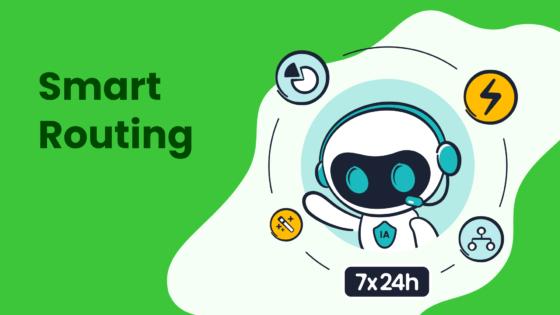
You have many types of customer service channels to choose from, including phone or Sobot call center, email, live chat, chatbots powered by Sobot AI, social media, messaging apps, self-service, forums, in-person support, and omnichannel solutions. Each customer service channel works best for different types of customers and situations. For example, people under 40 often prefer chatbots and apps, while those over 40 stick with Sobot call center and email. Nearly 40% of customers say having multiple customer service channels matters most. Sobot, a leader in omnichannel customer service, helps you connect all types of customer service channels in one place, making it easier to meet your customers’ needs. Choosing the right mix of customer service channels can improve satisfaction and help you resolve issues faster.
Types of Customer Service Channels
You have many types of customer service channels to choose from. Each channel works in a unique way and fits different customer needs. Understanding the types of customer service channels helps you pick the right mix for your business. Let’s look at the main types of customer service and how they work.
Phone and Call Center
Phone-based customer support remains one of the most trusted types of customer service. You can speak directly with an agent and get real-time help. This channel is best for urgent or complex issues. Many customers still prefer phone-based customer support because it feels personal and immediate. In fact, 59% of consumers choose the phone as their main customer service channel, and call centers reach an 86% customer satisfaction score.
| Customer Service Channel | Description | Benefits | Disadvantages |
|---|---|---|---|
| Phone | Traditional direct communication channel | Real-time communication; suitable for complex inquiries | Long wait times during peak hours; limited availability if understaffed |
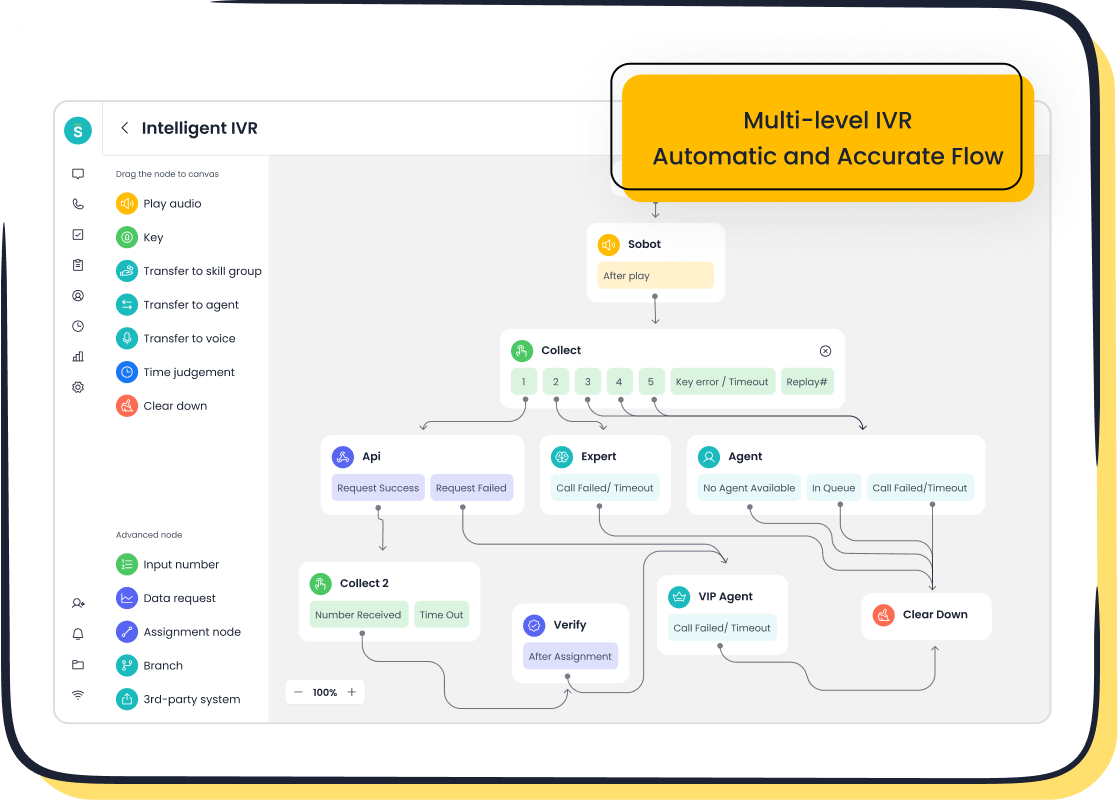
Sobot’s Voice/Call Center gives you a modern way to manage phone-based customer support. You get features like intelligent IVR, smart call routing, and a unified workspace for agents. Sobot’s platform supports global numbers and offers 99.99% uptime, making it reliable for all types of customer support needs. You can read more about Sobot’s Voice/Call Center here.
Tip: Aim to answer calls within 40 seconds to meet industry benchmarks and keep customers happy.
Email Support
Email-based customer support is a popular type of customer service channel for detailed questions or when customers need to send documents. Over 4 billion people use email worldwide, making it a common choice for both businesses and customers. Email-based customer support allows you to keep a record of conversations and use templates for faster replies.
| Channel | Communication Style | Response Time | Personalization | Scalability | Impact on CSAT |
|---|---|---|---|---|---|
| Asynchronous | Up to 12-24 hours (long) | Limited, slower interaction | High (can handle many tickets) | Generally lower CSAT due to slow response, but valued for flexibility and detail |
Most customers expect a reply within four hours, and many want a response in just one hour. Fast email-based customer support improves satisfaction and prevents repeat contacts. Sobot’s ticketing system helps you manage email-based customer support by turning emails into tickets, tracking progress, and automating workflows.
Note: Email-based customer support is great for international customers who need to communicate across time zones.
Live Chat and Messaging
Live chat customer support is now the top choice for many customers who want quick answers. About 41% of customers prefer live chat over phone or email. Live chat customer support lets you help customers instantly on your website or app. You can also use messaging apps like WhatsApp or Facebook Messenger for real-time support.
| Aspect | Statistic | Explanation |
|---|---|---|
| Customer preference for live chat | 41% prefer live chat over phone (32%), email (23%), social media (3%) | Live chat is the top choice for quick answers |
| Satisfaction levels | Live chat satisfaction 73%, email 61%, phone 44% | Live chat outperforms other channels in satisfaction |
| Return likelihood | 60% more likely to return to a site with live chat | Live chat improves customer retention |
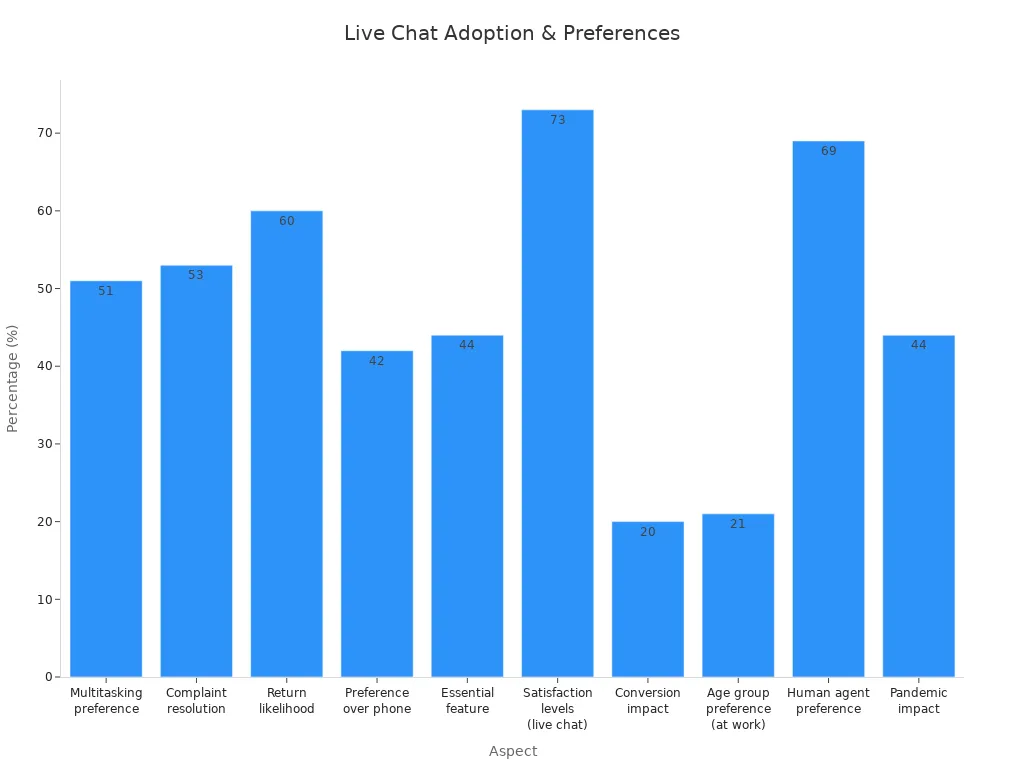
Sobot’s live chat customer support unifies all messages, tickets, and customer data in one workspace. You can use AI-powered chatbots to answer common questions and hand off complex issues to human agents. This approach increases first contact resolution and boosts customer satisfaction.
Customers under 40 often choose live chat support because it is fast and lets them multitask.
Social Media Channels
Social media has become a powerful customer service channel. Platforms like Facebook, Instagram, X (formerly Twitter), and LinkedIn let you connect with customers where they spend time. Social media channels allow you to answer questions, solve problems, and build trust in public or private messages.
| Social Media Channel | User Base | Benefits for Customer Service | Key Features |
|---|---|---|---|
| 3 billion users worldwide | Increases efficiency; easy to find; supports conversational marketing | Chatbots, proactive notifications, quick replies, appointment booking | |
| 2 billion users worldwide | Real-time conversations; visual communication | Chatbots, direct messages, story replies, voice and video calls | |
| X (Twitter) | 368 million users worldwide | Deflects calls; proactive service; humanizes brand | Quick replies, real-time conversations, advertising |
| Popular for B2B interactions | Private messaging and public posts for customer contact | Messaging, comments, posts |
You can use social media channels for real-time support, proactive outreach, and crisis management. Sobot’s omnichannel solution lets you manage all social media customer service channels in one place, making it easy to track and respond to every message. Opay, a leading financial platform, used Sobot’s omnichannel customer support to boost satisfaction from 60% to 90% by unifying social media, email, and voice channels. Read more about Opay’s story here.
Customers expect a reply on social media within 24 hours. Fast responses build loyalty and trust.
Self-Service Options
Self-service portals are now a must-have for modern customer service. About 67% of customers prefer to solve problems themselves rather than talk to an agent. Self-service portals let customers find answers, track orders, or reset passwords without waiting for help.
Common types of self-service tools include:
- Knowledge bases with FAQs and guides
- AI-powered chatbots for instant answers
- Self-service portals for account management
- Mobile apps for easy access on the go
- IVR systems for quick phone updates
Sobot’s AI-powered chatbots and self-service portals give customers 24/7 support. You can reduce the number of support tickets and let your team focus on complex issues. Self-help customer support empowers customers and increases satisfaction.
Self-help customer support saves time for both you and your customers.
Forums and Communities
Online forums and communities are valuable types of customer support channels. Customers help each other by sharing tips, solutions, and experiences. Forums create a searchable knowledge base that is always available.
| Contribution Aspect | Explanation |
|---|---|
| Peer-to-Peer Support | Customers help each other by sharing solutions and experiences, enabling faster problem resolution. |
| User-Generated Knowledge Base | Communities create a searchable, evolving resource of FAQs and solutions that customers can access anytime. |
| 24/7 Availability | Unlike traditional support, communities are always accessible, helping customers across time zones promptly. |
| Reduction in Support Tickets | Peer support reduces the number of direct support requests, allowing support teams to focus on complex issues. |
| Integration with Support Systems | Community platforms integrated with support tools share context, streamlining issue resolution. |
You can link customers to community threads to resolve issues quickly. Sobot’s omnichannel customer support can integrate with forums, letting you track and manage community interactions alongside other channels.
Forums offer self-help customer support and build a sense of community.
In-Person Support
Some types of customer service still require face-to-face help. In-person support is common in industries like retail, auto dealerships, beauty salons, fitness centers, and hospitality. You can offer personal attention and empathy that digital channels may lack.
- Amusement parks and entertainment centers rely on in-person ticket sales and guest services.
- Auto dealerships use in-person support for test drives and service appointments.
- Beauty salons and spas provide hands-on services that need physical presence.
Digital customer service channels offer speed and convenience, but in-person support adds a human touch. Combining both types of customer service methods creates a seamless experience. Sobot’s omnichannel solution helps you sync digital and in-person support for better customer satisfaction.
Note: In-person support works best for complex or sensitive issues that need empathy and trust.
Omnichannel Customer Service
Omnichannel customer service brings all types of customer service channels together. You can give customers a seamless experience across phone, email, live chat, social media, self-service, and in-person support. Omnichannel customer support means customers never have to repeat themselves, no matter which channel they use.
Key features of omnichannel customer service platforms:
- Unified customer view with all interactions in one profile
- Easy switching between channels without losing context
- AI-powered automation for fast, accurate responses
- Real-time analytics and reporting
- Integration with CRM and business tools
Sobot’s omnichannel solution lets you manage every customer service channel in one place. You can automate routine tasks, personalize support, and track performance. Businesses using omnichannel customer support see up to 91% higher customer retention rates and increased profits. Opay’s success with Sobot shows how omnichannel support can transform customer service and drive results.
Omnichannel customer support is the future of customer service. It helps you meet rising customer expectations and stay ahead in a digital world.
How Customer Service Channels Work
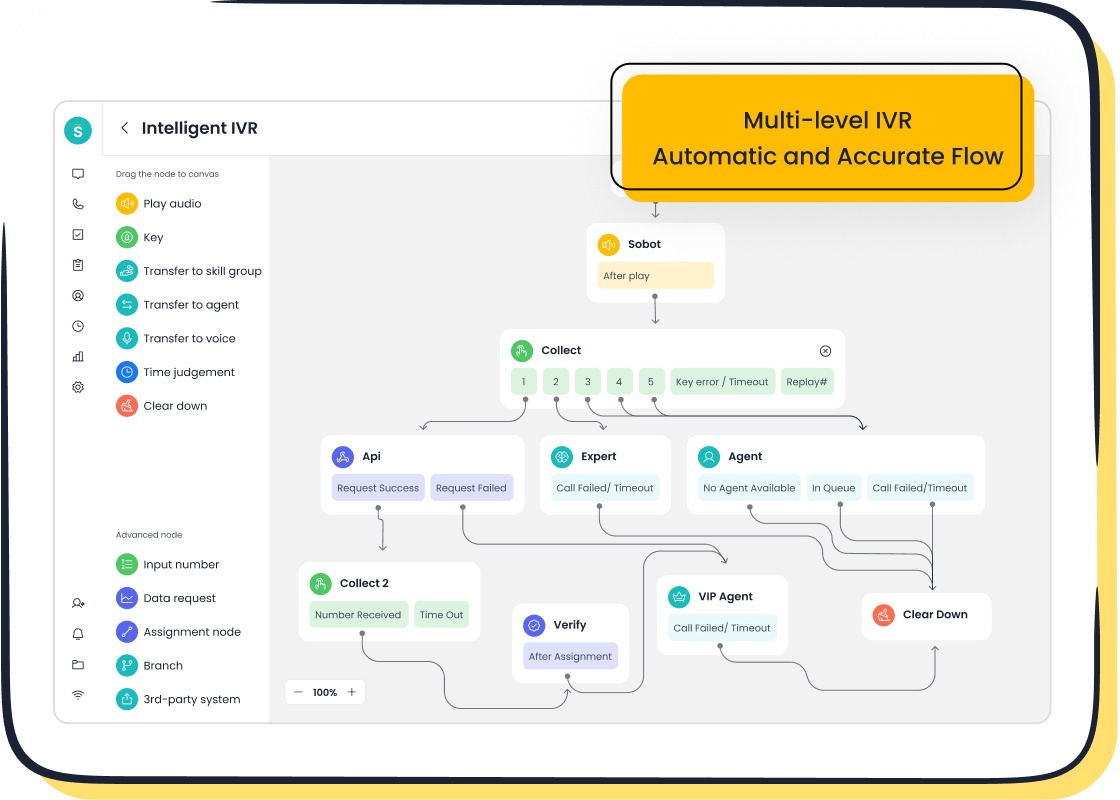
Channel Processes
You interact with customer service through different support channels, each with its own workflow. Here are some common processes:
- Chatbot-driven self-service starts when you report an issue to a chatbot. The chatbot guides you through steps to solve the problem. If you need a replacement, the system checks your warranty and contacts the fulfillment team. AI updates you and closes the case.
- When you place an order, you add items to your cart and check out. You get a confirmation email. The warehouse ships your order, and you receive a feedback request after delivery.
- If you give product feedback, customer support acknowledges it and sends it to the product team. The team reviews your feedback and updates you on any changes.
Support channels also include reactive workflows, where you reach out with a problem and agents respond using ticket systems. Proactive workflows happen when customer service teams contact you first, like sending reminders or checking on your account. Field service workflows send technicians to help you in person. Self-service workflows let you find answers in knowledge bases or with chatbots.
Integration and Automation
Modern customer service platforms like Sobot unify all support channels into one workspace. This means you can manage email, phone, live chat, social media, and more from a single place. The table below shows how integration and automation improve customer support:
| Feature/Capability | Description |
|---|---|
| Multi-Channel Support | Combines all support channels in one interface for easy access. |
| Automation and Workflows | Automates ticket routing, assignment, and data entry. |
| Centralized Customer Database | Keeps all customer interactions in one profile for better service. |
| AI Capabilities | Uses AI to answer common questions and draft replies. |
| Self-Service Portals | Lets customers solve simple issues on their own. |
Automation speeds up response times and reduces errors. Sobot’s AI-powered automation can cut average response times from hours to minutes. You get faster answers and agents can focus on complex issues.
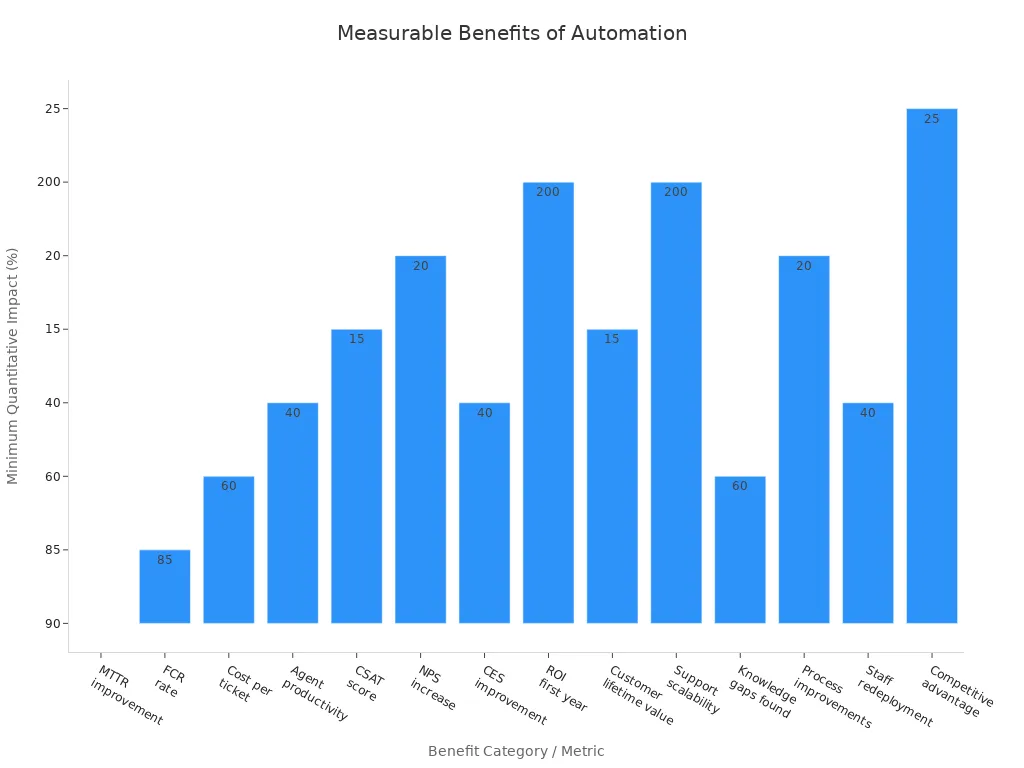
Customer Experience
You want customer service that is fast, easy, and personal. Good customer support channels make it simple to get help when you need it. Key factors that shape your customer experience include:
- Accessibility—You can reach support through many channels.
- Empathy—Agents understand your feelings and build trust.
- Communication—Clear, simple language avoids confusion.
- Response time—Quick replies keep you satisfied.
- Convenience—You get flexible options and easy processes.
Sobot’s omnichannel platform helps you switch between channels without repeating yourself. AI and automation personalize your customer service experience and keep your information up to date. When you use live chat customer support, you get instant help and can multitask. These features improve customer satisfaction and loyalty.
Pros and Cons of Customer Service Channels
Strengths of Each Channel
You have many types of customer service channels to choose from, and each one brings unique strengths to your business. Customers want options, with 40% saying that having multiple types of customer support matters most. Phone and email remain popular with older customers, while younger customers prefer online chat, social media, and messaging. Online chat ranks as the second-best channel for quick issue resolution. Self-service options, like knowledge bases and AI chatbots, are in high demand—88% of customers want online self-service, and 92% are open to using knowledge bases. AI and chatbots are set to boost operational efficiency by 25% by 2025.
| Customer Service Channel | Significant Strengths |
|---|---|
| Phone/Call Center | Real-time help, personal touch, trusted for complex issues |
| Detailed responses, record-keeping, good for non-urgent support | |
| Live Chat/Messaging | Fast answers, multitasking, high satisfaction for younger customers |
| Social Media | Public engagement, quick outreach, builds brand trust |
| Self-Service | 24/7 access, instant solutions, reduces agent workload |
| Omnichannel | Seamless experience, unified customer view, flexible switching |
Sobot’s omnichannel platform brings all these types together, letting you deliver proactive customer service and boost customer satisfaction.
Limitations and Challenges
Every type of customer service channel has its challenges. You may face high customer expectations and the need to communicate clearly across many types of customer support. Phone and messaging channels require quick, clear responses, but dropped calls or missed messages can frustrate customers. Email support often feels slow, especially for urgent issues. Social media demands fast, public replies, which can impact your brand if not managed well. Self-service options must stay updated and easy to use, or customers will get frustrated—77% say poor self-service is worse than none. Omnichannel integration can be tough, as you need to unify customer data and keep every type of customer service working together.
Tip: Use customer feedback and journey mapping to spot gaps and improve your customer support channels.
Best-Use Scenarios
You should match the types of customer service channels to your business needs and customer preferences. Here are some best-use scenarios:
- Use phone and call centers for urgent or complex issues that need a personal touch.
- Choose email support for detailed questions or when customers need to send documents.
- Offer live chat and messaging for fast, convenient help, especially for younger customers.
- Rely on social media for public engagement, quick updates, and brand building.
- Provide self-service options for common questions and 24/7 support.
- Adopt omnichannel customer service to give customers a seamless experience across all types.
Sobot helps you combine these types of customer support into one platform, making it easy to deliver proactive customer service and meet rising customer expectations. When you use the right mix, you improve customer satisfaction and build loyalty.
Choosing the Right Customer Service Channel
Assessing Customer Needs
You should start by understanding what your customers want from customer support. Some customers like to talk on the phone, while others prefer live chat or self-help options. You can use surveys or feedback forms to ask customers about their favorite types of customer service. For example, 67% of customers say they prefer self-help before reaching out to an agent (source). You should also look at your customer journey to see where customers need the most help. This helps you choose the right types of customer support for each step.
Business Goals and Resources
You need to match your customer support channels to your business goals. If you want to offer fast answers, live chat and messaging work well. If you want to give detailed help, email or phone support may be better. You should also think about your budget and team size. Some types of customer service methods, like AI chatbots or self-help portals, can save time and money. Sobot’s Voice/Call Center gives you a stable way to handle calls, while the omnichannel solution lets you manage all types of customer support in one place.
Industry Considerations
Different industries need different types of customer support. Retail stores often use live chat and social media. Banks and healthcare providers may need secure phone or email support. Gaming companies might use forums and self-help guides. You should look at what works best in your industry and what your competitors use. Sobot serves many industries, including retail, finance, and gaming, with flexible customer service methods that fit each business.
Optimizing Channel Mix
You should review your customer support channels often. Check which types get the most use and which ones customers like best. Use data and feedback to improve your mix. For example, if many customers use self-help, add more guides or AI chatbots. If you see more calls, make sure your phone support is strong. Sobot’s omnichannel platform helps you track all types of customer support and make changes quickly. This leads to proactive customer service and higher customer satisfaction. You can deliver personalized service and support customers at every step.
Tip: Test new types of customer support on a small group before rolling them out to everyone.
Future Trends in Customer Service Channels
AI and Automation
You will see AI and automation shape the future of customer support. Many companies now use AI chatbots, virtual assistants, and smart tools to answer questions and solve problems quickly. In fact, 79% of contact center agents say AI assistants help them solve issues faster and more effectively. AI can handle simple requests, so human agents can focus on building relationships and solving complex problems. You may notice that AI-powered chatbots and virtual assistants can answer questions at any time, even outside business hours. These tools also help companies personalize your experience by using your data to predict what you need next. Companies like Sobot use AI to automate workflows, route tickets, and provide instant answers, making customer support faster and more accurate.
- AI chatbots and virtual assistants now handle complex questions.
- AI-driven tools create a single view of your data for better service.
- Automation speeds up ticket routing and reduces wait times.
- Personalization goes beyond greetings, offering proactive help.
Omnichannel Evolution
You expect to reach customer support through many types of channels, such as phone, email, live chat, SMS, and social media. Omnichannel customer support brings all these channels together, so you get a seamless experience. Companies now use advanced platforms to connect every channel, making sure you never have to repeat yourself. Sobot’s omnichannel support solution lets you switch between channels without losing your place. This unified approach helps agents see your full history and respond faster. As technology grows, you may even see new channels like extended reality or voice assistants become part of the mix.
| Channel | Experience Goal | Example Benefit |
|---|---|---|
| Phone | Real-time help | Speak to an agent instantly |
| Live Chat | Quick answers | Get support while browsing |
| Social Media | Public engagement | Fast replies on your favorite app |
| Self-Service | 24/7 solutions | Find answers anytime |
Customer Expectations
Your expectations for customer support keep rising. You want fast, friendly, and personalized help on every channel. Studies show that 62% of companies have improved customer support with AI, especially by making it more personal. You also want companies to remember your history and solve your problems without delay. Businesses use AI-powered CRM systems to unify your data and deliver tailored solutions. Sobot leads the way by offering a unified workspace, AI chatbots, and real-time analytics. These tools help companies meet your needs and keep you satisfied. As technology advances, you will see even more personalized and proactive customer support.
Note: The future of customer support will focus on speed, personalization, and seamless experiences across all types of channels.
Understanding the different types of customer service channels helps you meet customer needs and boost satisfaction. You can choose the right mix of customer service channels for your business by looking at data and trends. For example, 40% of customers value having multiple types of customer service channels (source). Sobot’s omnichannel and Voice/Call Center solutions let you manage all types of customer service in one place. Start by reviewing your current customer service channels. You can reach out to Sobot for a free demo and see how you can improve your support.
FAQ
What are the most popular customer service channels today?
You see phone, email, live chat, social media, and self-service as the top customer service channels. Over 60% of customers use at least three types of customer service channels when they need help. Sobot’s omnichannel platform brings all these customer support options together.
How do I choose the right types of customer service channels for my business?
Start by asking your customers what they prefer. Use surveys or feedback forms. Check which customer service channel gets the most use. Sobot’s analytics tools help you track and compare the performance of different types of customer support.
Why is omnichannel customer support important?
Omnichannel customer support lets you connect all types of customer service channels. You give customers a seamless experience. For example, Opay improved satisfaction by 30% after using Sobot’s omnichannel solution. Customers never have to repeat themselves when switching channels.
Tip: Omnichannel customer service channels can boost customer loyalty and retention rates by up to 91%. (source)
Can AI-powered chatbots replace human agents in customer support?
AI chatbots handle simple questions fast. They work 24/7 and reduce wait times. However, you still need human agents for complex issues. Sobot’s AI-powered chatbots work with live agents to give you the best customer service channel experience.
See Also
Comprehensive Overview Of Omnichannel Call Center Platforms
Step-By-Step Approach To Deploy Omnichannel Contact Centers
Enhance SaaS Customer Service Using Live Chat Techniques
